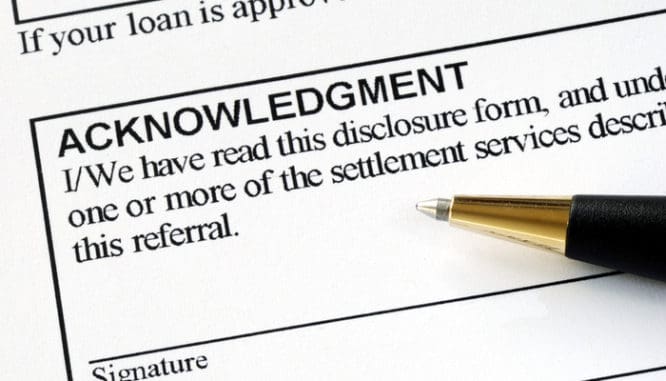Countdown to Closing: Key Documents You Will See, Touch and Sign When Buying a House
- Published on
- 5 min read
-
 Jody Ellis Contributing AuthorClose
Jody Ellis Contributing AuthorClose Jody Ellis Contributing Author
Jody Ellis Contributing AuthorJody Ellis is a freelance writer with more than 15 years of experience in the writing industry. Her work includes copywriting and content marketing for real estate professionals, stories covering real estate trends and housing markets, and varied articles on decor and design. In addition to buying and selling several homes herself, she's also owned and managed rental properties, and previously worked in mortgage lending.
Whether you’re a first-time homebuyer or well-seasoned as to the ins and outs of home purchases, the closing process can be a stressful and confusing time. Those last few days before your house is yours are often a whirlwind of last-minute documentation, requests from your lender and title company, and meetings with your real estate agent.
Then you sit down to close and have to read and sign what amounts to a serious stack of paperwork, and before you know it, you start feeling like you’re signing the same document over and over again.
It may seem daunting, but we broke down the closing process to make it easy to understand and spoke to top escrow agents and experienced agents who have taken many buyers through those final steps.
Starting from when you get the initial Closing Disclosure to the moment you clutch the keys to your new home, this list will help you understand and identify many of the key documents you’ll see or sign during your home closing. We’ll also guide you on what to bring to the closing table, special issues to be aware of, and how to prevent any unwelcome surprises along the way.

Closing documents for your home purchase
Here are some of the key documents you can expect to see during the closing process.
Three days before
Closing Disclosure
Your lender is required to send this document three business days prior to closing. The Closing Disclosure outlines your mortgage loan terms and conditions, payments, and the funds required to close.
Buyers need to make sure they read and understand this document before closing, as any changes will result in a delay.
One to two days before
Proof of homeowner’s insurance
You are required to provide your lender with proof of insurance on your new home prior to closing. Contact your insurance agent at least a few days prior to closing so that they can get the insurance rider to your lender.
One day before
Secure your funds
Make sure you have your funds ready to go, including your down payment (minus the earnest money you already paid) and closing costs. Confirm any wire transfer instructions directly with your title company.
Day of closing
Loan application
You will review and sign your original loan application one more time.
Promissory note
This covers your commitment and responsibility to the mortgage loan. Make sure you read it thoroughly, as this is your acknowledgement that you understand you are financially responsible for the loan.
Deed of trust or mortgage contract
The deed of trust or mortgage contract (depending on which state you live in) legally puts your home up as collateral for the mortgage loan. If you default, ownership will revert to the lender.
Title documents
These documents will tell you who else has owned the home and verify there are no liens on the property. This will also include title insurance, which protects you in case the title search didn’t uncover an existing lien.
If a lien is found after closing, your ownership could be in jeopardy. But if you purchased title insurance, the title company will fight any claims on your behalf.
Deed
This transfers ownership of the home from the seller to you. The seller will sign off on it first, and it is sent to the city or county recorder after closing.
Affidavits
Title companies often require buyers to sign affidavits that confirm their identity and legal name.

Transfer of tax declarations
Depending on your state’s laws, you may have to sign paperwork disclosing the price of your home and the sales tax you owe.
Certificate of occupancy
This is sometimes required for a new build. It certifies that the home is in compliance with all building codes and laws, and that it is suitable for occupancy.
Bill of sale
This transfers any property in the home to the buyer that the seller has agreed to include with the sale, which could be anything from appliances to furniture. You will want to verify that all items previously agreed upon are listed on the bill of sale.
Riders
These documents are usually part of the closing package when purchasing condos or non-owner-occupied properties, and they clarify additional terms to the original contract, such as if a lender charges a penalty for paying off the loan early.

After closing
Escrow account disclosure statement
You’ll receive the escrow disclosure within 45 days of closing, and it provides information about the escrow account created by the lender. The lender collects your taxes, insurance, HOA fees — and private mortgage insurance (PMI) if you’re paying it — in this account and makes the payments on your behalf.
What you need when you close on your new home
Sandy Moursy, a Senior Escrow Officer with Chicago Title of Nevada, has more than 25 years’ experience in the industry.
She says that the main thing buyers really need to physically bring to closing is their valid photo ID. “One thing a buyer should be aware of is that the notary, who authenticates signatures at closing, requires that the names on the closing documents are the names as are listed on your identification,” she explains. “If you’ve recently married but haven’t changed your name, you need to make sure the closing documents are prepared in your current legal name.”
You should also talk to your title company about whether you’re required to bring a separate cashier’s check for closing costs, and also verify the amount. You will usually send a wire transfer of the down payment directly to the title company — again, you will want to confirm this.
Both Hanna and Moursy say that one of the bigger problems that buyers may not be aware of is wire fraud. Says Moursy: “The title company will email the buyer wire instructions for the down payment and closing costs, and that email is usually encrypted to protect from fraud. But sometimes that email can still get intercepted by scammers. They will send a fake email that looks just like the title company’s email, requesting the buyer wire the money to them.”
Adds Hanna, “I tell my clients that before they wire any money, they should call the title company to verify that the email they received is valid. There are a lot of scams going on these days, and even when the instructions look legitimate, they might not be.”
Moursy also notes that buyers should not call the phone number listed on the email they receive, because if it is fraudulent, the phone number is most likely fraudulent as well. “Look up the phone number of the title company separately,” she advises. “I’ve had buyers call the number on the email they received, only to end up talking to the scammers instead of the title company.”
In order to make the closing experience more seamless, Moursy urges buyers to get any requested documents to their lender in a timely manner above all else.
“The lender needs 30 days to prepare for closing, so when they ask for certain things, it’s important to provide them right away,” she says. “The closing process is time-sensitive, and having everything in on time is crucial. If you don’t get those requested items to the lender, the closing may have to be delayed.”

Closing pitfalls to avoid
While closing on your new home is usually a straightforward process, there are potential pitfalls and unexpected surprises that buyers might encounter. Las Vegas Realtor Daryl Hanna, a 17-year veteran of the industry, says he advises his buyers to make sure to have the lender review the estimated Closing Disclosure with them prior to the actual closing date.
“I’ve seen a lot of buyers walk into closing, and the Closing Disclosure shows additional expenses or a higher-than-expected payment,” he says. “It is very important that buyers know what their final numbers are, from their interest rate to final closing costs to payment. You don’t want any surprises.”
How a quality agent can make for a seamless closing on your new home
You might think that your agent is just there to help you find a house, but a good agent will stay with you every step of the way, by your side from the moment you make your initial offer to the keys being placed in your hands. Having an agent you trust, alongside a reputable lender and title company, can help make the closing process a positive experience.
Moursy says that having a dependable agent is really the key to making the whole process easy for a buyer. “If a buyer doesn’t have a good agent, sometimes they end up communicating primarily with the loan officer whose primary responsibility is to the loan, not the actual purchase transaction, and there can often be last-minute issues with the property or the seller that can pop up that the buyer doesn’t find out about until closing day” she says. “It’s important to have an agent who stays on top of any problems.”
Hanna and Moursy agree that your agent should be proactive in solving problems as they arise, keep you informed of changes, and communicate with the lender and title company as needed in order to make closing on your new home stress-free.
For Hanna, those moments of closing are some of the best. “Even if the transaction has rough spots, closing is usually when a buyer is the happiest,” he says. “Getting those keys in hand is one of the most joyous parts of the transaction.”
Header Image Source: (Shutterstock.com/Jat306)
